WordPress sitenizi yeni bir alan adına taşımak, dikkatli bir planlama gerektiren büyük bir adımdır. Alan adınızı değiştirmek SEO sıralamanızı etkileyebilir, bu nedenle süreci dikkatli bir şekilde ele almak çok önemlidir.
Alan adı değişikliği sürecini birçok kez başarıyla yönettik, bu nedenle potansiyel tuzakları ve bunlardan nasıl kaçınılacağını ilk elden biliyoruz.
Alan adı geçişi sırasında geçici SEO dalgalanmaları kaçınılmaz olsa da bu etkiyi azaltabilirsiniz. Doğru yaklaşımla, arama trafiğinizi ve sıralamalarınızı hızla geri kazanabilirsiniz.
Bu kılavuzda, WordPress’i SEO’yu kaybetmeden yeni bir alan adına taşımanın doğru yolunu göstereceğiz.
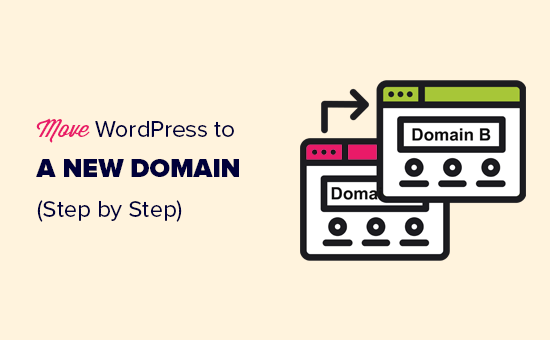
WordPress sitenizi yeni bir alan adına taşımak korkutucu olabilir, ancak öyle olmak zorunda değil. Sürecin her adımında size yol göstermek için buradayız.
WordPress sitenizi yeni bir alan adına taşımanın belirli bir adımına gitmek için aşağıdaki bağlantılardan herhangi birine tıklayabilirsiniz:
- What to Know Before You Change Domains
- Pre-Steps: What You Need to Get Started
- Step 1: Create a Duplicator Package of Your WordPress Site
- Step 2: Create a Database for Your New Domain Name
- Step 3: Unpack WordPress on Your New Domain Name
- Step 4: Set Up Permanent 301 Redirects
- Step 5: Notify Google About Your New Domain
- Notify Your Users About the New Domain Name
- Video Tutorial
Alan Adlarını Değiştirmeden Önce Bilmeniz Gerekenler
Başlamadan önce bilmeniz gereken birkaç şey var.
Yeni bir alan adına aktarma işlemi, Google ve diğer arama motorlarının değişikliklere uyum sağlaması gerekeceğinden arama motoru sıralamalarınızı geçici olarak etkileyecektir.
Ayrıca arama trafiğinizi de geçici olarak etkileyecektir. Lütfen bunun normal olduğunu ve yeni bir alan adına geçen tüm web sitelerinin başına geldiğini unutmayın.
Ancak bu kılavuzu takip ederek SEO etkisini önemli ölçüde azaltabilirsiniz. WordPress sitenizi yeni bir alan adına taşımanın, uygun 301 yönlendirmelerini ayarlamanın ve arama motorlarını bilgilendirmenin doğru yolunu göstereceğiz.
Lütfen bu kılavuzun bir WordPress sitesini yeni bir ana bilgisayara taşımak için olmadığını unutmayın. Bu yalnızca bir alan adını değiştirmek içindir. Süreç benzer olsa da, birkaç ekstra adım vardır. Bu ekstra adımlar SEO sıralamanızı ve trafiğinizi korumanıza yardımcı olacaktır.
Son olarak, eski web siteniz WordPress.com’daysa, bunun yerine WordPress. com’dan WordPress.org’a nasıl taşınacağına ilişkin kılavuzumuzdaki talimatları izlemeniz gerekir.
Ön Adımlar: Başlamak için İhtiyacınız Olanlar
Bu kılavuzda, WordPress web sitenizin oldsite.com’da kurulu olduğunu ve onu newsite.com’a taşımaya çalıştığınızı varsayıyoruz.
Ayrıca halihazırda bir WordPress hosting hesabınız olduğunu ve web hosting kontrol panelinize aşina olduğunuzu varsayıyoruz.
Ayrıca FileZilla gibi bir FTP istemcisini nasıl kullanacağınızı veya hosting hesabı kontrol panelinizde bulunan Dosya Yöneticisi uygulamasını kullanarak dosyaları nasıl düzenleyeceğinizi bilmeniz gerekir.
Bir web barındırma sağlayıcınız yoksa veya yeni bir sağlayıcıya geçmek istiyorsanız, Bluehost (küçük siteler için harika + ücretsiz alan adı ile birlikte gelir) ve SiteGround veya WP Engine (daha büyük siteler veya çevrimiçi mağazalar için harika) kullanmanızı öneririz.
Bunları yerine getirdiğinizde, süreci başlatmaya hazırsınız demektir!
Adım 1: WordPress Sitenizin Çoğaltıcı Paketini Oluşturun
Yapmanız gereken ilk şey WordPress sitenizin tam bir yedeğini oluşturmaktır.
Daha sonra bu yedeği web sitenizin bir kopyasını oluşturmak için kullanacaksınız, böylece eski alan adınızdan yenisine yönlendirmeleri düzgün bir şekilde ayarlayabilirsiniz.
Birçok WordPress yedekleme eklentisi mevcut olsa da, bu eğitim için Duplicator kullanacağız.
Duplicator en iyi WordPress yedekleme ve taşıma eklentisidir. Hem kendi işletmelerimiz hem de müşterilerimiz için sayısız web sitesini taşımak için kullandık. Çok büyük web siteleri için bile güvenilir bir şekilde çalıştığını gördük.
Not: Duplicator’ın bu geçiş için kullanabileceğiniz ücretsiz bir sürümü de mevcuttur. Ancak, otomatik bulut yedeklemeleri, tek tıklamayla web sitesi kurtarma, daha kolay geçişler ve daha fazlası gibi daha fazla özelliğin kilidini açmak için ücretli bir plana yükseltmenizi öneririz.
Eski alan adınıza Duplicator eklentisini yükleyip etkinleştirerek başlayalım. Daha fazla ayrıntı için, bir WordPress eklentisinin nasıl kurulacağına ilişkin adım adım kılavuzumuza bakın.
Eklenti etkinleştirildiğinde, WordPress yöneticinize bir Duplicator menü öğesi ekleyecektir. WordPress sitenizin yeni bir yedeğini veya kopyasını oluşturmak için Duplicator ” Yedekler sayfasına gitmeniz ve ardından ‘Yeni Oluştur’ düğmesine tıklamanız gerekir.
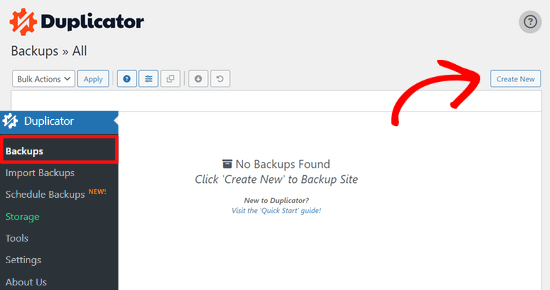
Duplicator şimdi arka sihirbazı başlatacak ve bu pakete otomatik olarak bir isim atayacaktır.
Devam etmek için ‘İleri’ düğmesine tıklayın.
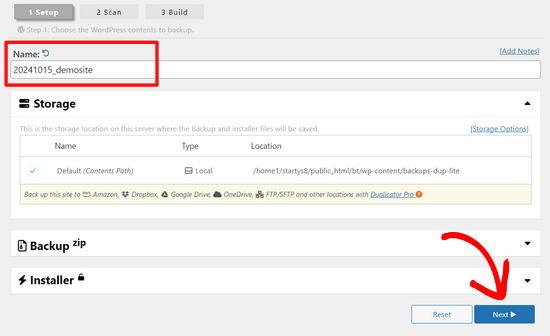
Duplicator şimdi her şeyin yolunda olup olmadığını görmek için bazı testler yapacaktır. Eklenti bir sorun bulursa, talimatlar içeren bir uyarı göreceksiniz.
Tüm öğeler ‘İyi’ olarak işaretlenmişse, ‘Oluştur’ düğmesine tıklayın.
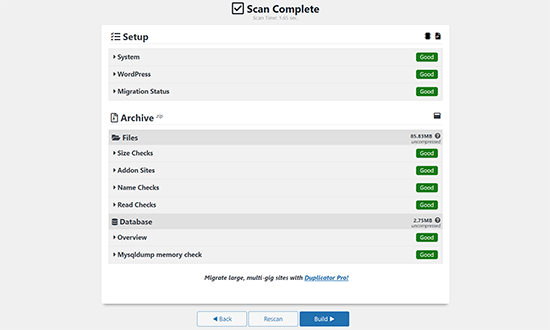
Eklenti şimdi web sitenizin dosyalarından bir çoğaltıcı paketi oluşturmaya başlayacaktır. Sitenizin büyüklüğüne bağlı olarak bu işlem birkaç dakika sürebilir.
Bitirdiğinizde, bir ‘İndir’ seçeneği göreceksiniz. Bu seçeneğe tıkladığınızda her iki dosyayı da indirme veya Yükleyici ve Arşivi (zip) ayrı ayrı indirme seçenekleri gösterilecektir.
Bilgisayarınıza indirmek için ‘Her İki Dosyayı da İndir’ seçeneğini seçin.
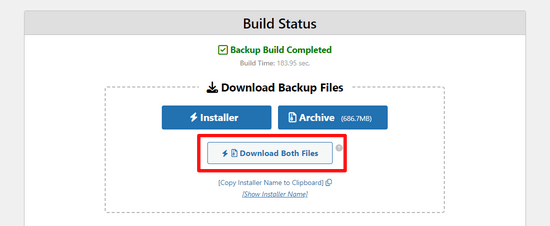
Arşiv dosyası, WordPress dosyalarınızın eksiksiz bir kopyasıdır. WordPress temalarınızı, kalıcı bağlantı ayarlarınızı, eklentilerinizi, yüklemelerinizi ve WordPress eklentileri tarafından oluşturulan diğer tüm dosyaları içerir.
Yükleyici betiği, arşiv dosyasını açarak WordPress geçişini otomatikleştirecek ve çalıştıracak bir PHP dosyasıdır.
Adım 2: Yeni Alan Adınız İçin Bir Veritabanı Oluşturun
WordPress sitenizi yeni alan adına taşımadan önce, WordPress’i yeni alan adınızda açmak için yeni bir SQL veritabanına ihtiyacınız olacaktır.
Zaten bir veritabanı oluşturduysanız, bu adımı atlayabilirsiniz.
Bir veritabanı oluşturmak için hosting hesabınızın cPanel kontrol panelini ziyaret etmeniz, ‘Veritabanları’ bölümüne gitmeniz ve ardından‘MySQL Veritabanları’ simgesine tıklamanız gerekir.
Bluehost’ta nasıl bulacağınızı göstereceğiz, ancak temel talimatlar aynıdır ve tüm barındırma sağlayıcıları için geçerli olmalıdır.
Bluehost hesap panonuza giriş yapın ve web sitenizin altındaki ‘Ayarlar’ düğmesine tıklayın.
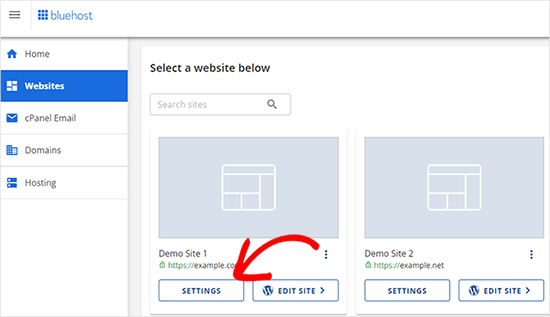
Site ayarlarınızın altında, ‘Gelişmiş’ sekmesine geçmeniz gerekir.
cPanel bölümüne doğru biraz aşağı kaydırın ve ‘Yönet’e tıklayın.
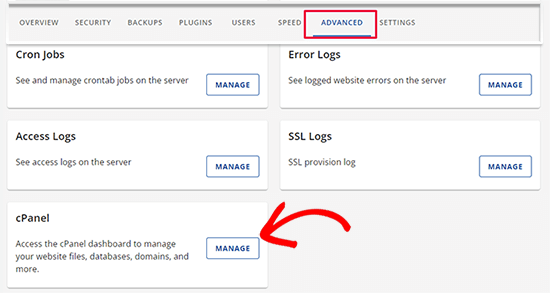
Bu işlem cPanel kontrol panelini açacaktır.
Veritabanları bölümüne ilerleyin ve ‘MySQL Veritabanları’ seçeneğine tıklayın.
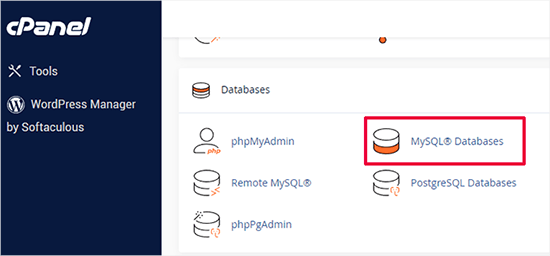
Not: Hosting kontrol paneliniz ekran görüntülerinden biraz farklı görünebilir. Ancak, yine de yeni bir veritabanı oluşturma seçeneği içeren bir Veritabanları bölümü bulabilmeniz gerekir.
Veritabanınız için bir ad girin ve ardından ‘Veritabanı Oluştur’ düğmesine tıklayın.
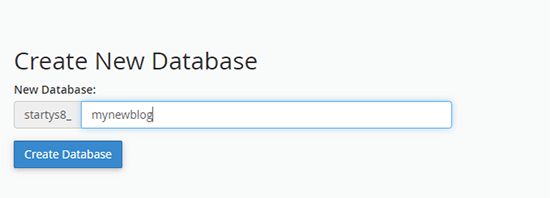
cPanel şimdi sizin için yeni bir veritabanı oluşturacaktır. Bundan sonra, MySQL Kullanıcıları bölümüne gitmeniz gerekiyor.
Ardından, yeni kullanıcınız için bir kullanıcı adı ve parola girin ve ‘Kullanıcı Oluştur’ düğmesine tıklayın. Kullanıcı adı ve şifreyi güvenli bir yere not ettiğinizden emin olun.
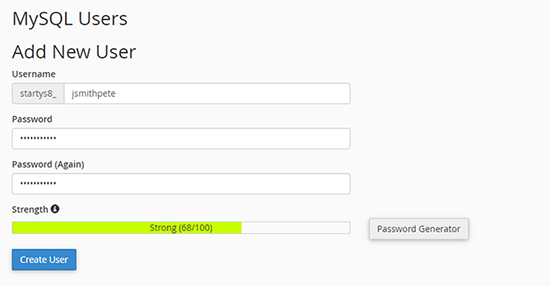
Yeni oluşturduğunuz kullanıcı hala veritabanı üzerinde çalışma iznine sahip değil. Bunu değiştirelim.
‘Veritabanına Kullanıcı Ekle’ bölümüne ilerleyin. İlk olarak, ‘Kullanıcı’ alanının yanındaki açılır menüden oluşturduğunuz veritabanı kullanıcısını seçin. Ardından yeni oluşturduğunuz veritabanını seçin ve ‘Ekle’ düğmesine tıklayın.
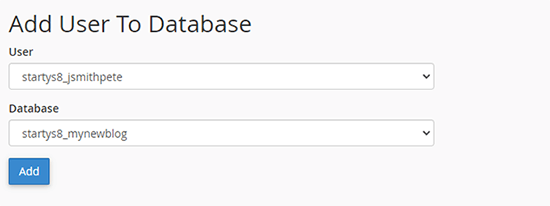
Ardından, kullanıcı için ayrıcalıklar seçmeniz istenecektir.
‘Tüm Ayrıcalıklar’ı seçin ve devam etmek için ‘Değişiklikleri Yap’ düğmesine tıklayın.
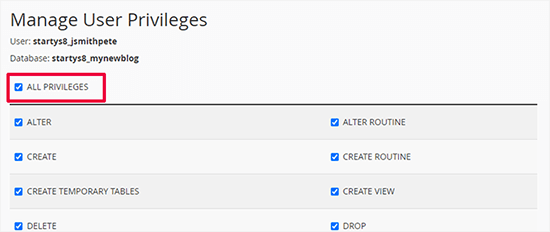
Veritabanınız artık hazırdır ve WordPress’i yeni alan adına taşımak için kullanılabilir.
Veritabanı adını, kullanıcı adını ve parolayı not ettiğinizden emin olun. Bu bilgilere bir sonraki adımda ihtiyacınız olacak.
3. Adım: WordPress’i Yeni Alan Adınızda Kullanıma Açın
Şimdi, daha önce indirdiğiniz Duplicator dosyalarını yeni alan adınıza yüklemeniz gerekir.
Duplicator paketi WordPress kurulumunuzu da içerir. Bu, yeni alan adınıza WordPress yüklemenize gerek olmadığı anlamına gelir.
İlk olarak, bir FTP istemcisi kullanarak alan adınıza bağlanın. Bağlandıktan sonra, web sitenizin kök dizininin tamamen boş olduğundan emin olun.
Bundan sonra, arşivi ve yükleyici dosyalarını kök dizine yükleyebilirsiniz. Bu genellikle public_html olarak adlandırılır.
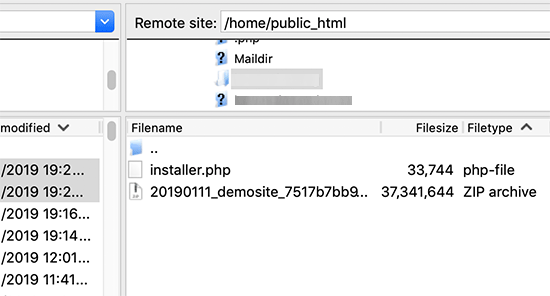
Her iki dosyanın da yüklenmesi tamamlandığında, artık WordPress’in paketini açmaya hazırsınız demektir.
Yeni bir tarayıcı sekmesi açın ve aşağıdaki URL’ye gidin:
http://example.com/installer.php
example.com adresini yeni alan adınızla değiştirmeyi unutmayın. Bu, Duplicator geçiş sihirbazını başlatacaktır.
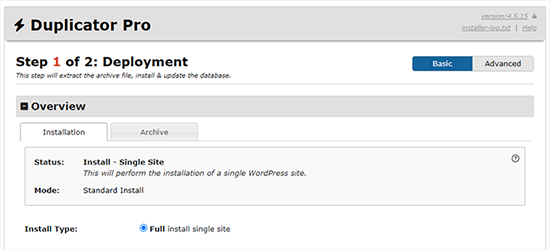
Yükleyici arşiv dosyasını arayacak ve ardından ekranda sizin için seçenekleri otomatik olarak seçecektir.
Bir önceki adımda oluşturduğunuz veritabanının bilgilerini girmek için biraz aşağı kaydırın.
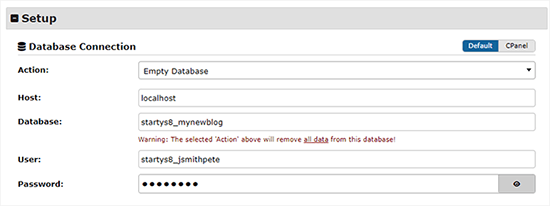
Bunun altında, Duplicator size otomatik olarak eski alan adınızın ve yeni alan adınızın URL’sini gösterecektir.
Her şey iyi görünüyorsa, devam etmek için ‘Doğrula’ düğmesine tıklayın.
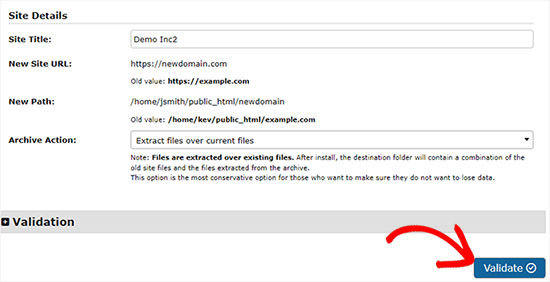
Duplicator şimdi verdiğiniz bilgileri kullanarak veritabanına bağlanmaya çalışacaktır.
Başarılı olduğunda, size bir Doğrulama Geçidi gösterecektir. Aksi takdirde, nasıl düzelteceğinize dair ayrıntılar içeren bir uyarı gösterecektir.
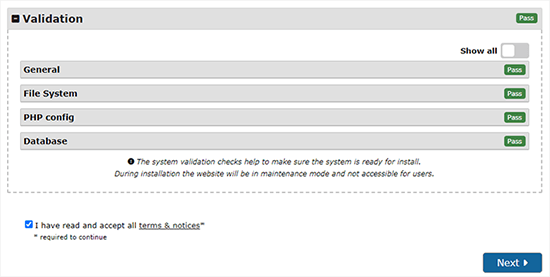
Devam etmek için ‘İleri’ düğmesine tıklayın.
Duplicator şimdi WordPress web sitenizi içe aktarmaya başlayacaktır. Bittiğinde, Yönetici Girişi düğmesiyle birlikte bir başarı mesajı göreceksiniz.
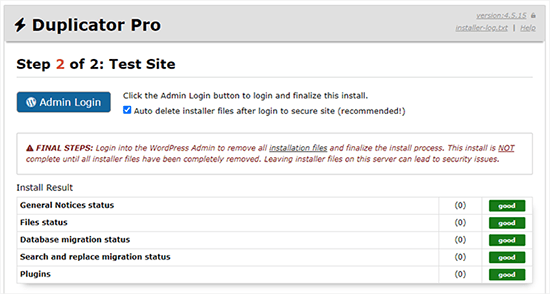
Duplicator URL’leri otomatik olarak yeni alan adınıza güncelleyecektir. Şimdi sonraki adımları tamamlamak için ‘Yönetici Girişi’ düğmesine tıklayabilirsiniz.
Adım 4: Kalıcı 301 Yönlendirmelerini Ayarlayın
Bir sonraki adım, eski alan adınıza gelen kullanıcıları yeni alan adına yönlendirmektir. Bu, 301 yönlendirmeleri ayarlanarak yapılır.
301 yönlendirmeleri SEO ve kullanıcı deneyimi için çok önemlidir. Bunları eklemek, kullanıcıları ve arama motorlarını otomatik olarak yeni alan adınıza yönlendirmenizi sağlar.
Başka bir deyişle, birisi eski alan adınızdaki bir gönderiye veya sayfaya geldiğinde 404 hatası görmek yerine otomatik olarak yeni alan adınızdaki aynı gönderiye veya sayfaya yönlendirilir.
Yönlendirmelerinizi yerinde tutmak için eski WordPress yüklemenizi etkin tutmanız gerekir, böylece yeni oluşturduğunuz yüklemeye yönlendirmeye devam edebilir.
Yönlendirmeleri ayarlamanın iki yolu vardır. İlk yöntem kolaydır ve sadece birkaç tıklama alır. İkinci yöntem ise dosyaları manuel olarak düzenlemenizi gerektirir.
Yöntem 1: All in One SEO ile 301 Yönlendirmeleri Kurun
Bu yöntem için All in One SEO’ya (AIOSEO) ihtiyacınız olacak. Piyasadaki en iyi WordPress SEO eklentisidir ve WordPress web sitenizi SEO için kolayca optimize etmenizi sağlar.
Öncelikle eski alan adınıza All in One SEO eklentisini yüklemeniz ve etkinleştirmeniz gerekir. Daha fazla ayrıntı için, bir WordPress eklentisinin nasıl kurulacağına ilişkin adım adım kılavuzumuza bakın.
Not: Yönlendirme yöneticisi eklentisine erişmek için eklentinin en azından Pro sürümüne ihtiyacınız olacak. Arama motoru sıralamanızı ve trafiğinizi daha da artırmak için AIOSEO’yu yeni WordPress sitenize de kurabilirsiniz.
Eski alan adınızda etkinleştirme yaptıktan sonra, All in One SEO ” Yön lendirmeler sayfasını ziyaret etmeniz ve ‘Yönlendirmeleri Etkinleştir’ düğmesine tıklamanız gerekir.
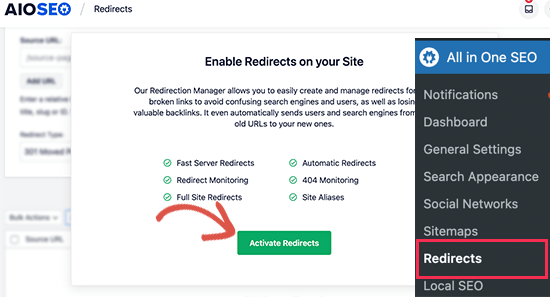
Ardından, ‘Tam Site Yönlendirmesi’ sekmesine geçmeniz ve ‘Sitenin Yerini Değiştir’ geçişini açmanız gerekir.
Bundan sonra, ‘Etki alanına taşı’ seçeneğinin yanına yeni etki alanı adınızı girmeniz gerekir.
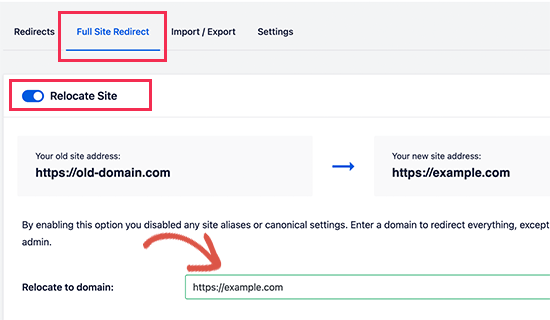
Ayarlarınızı kaydetmek için ‘Değişiklikleri Kaydet’ düğmesine tıklamayı unutmayın.
Yöntem 2: Yeni Etki Alanına Yönlendirmeleri Elle Ayarlama
Bu yöntem, eski alan adınızdaki WordPress .htaccess dosyasını düzenlemenizi gerektirir.
Öncelikle, FTP kullanarak eski sitenize bağlanmanız ve .htaccess dosyasını düzenlemeniz gerekir.
Bu, wp-includes veya wp-admin klasörünüzle aynı dizinde bulunacaktır. .htaccess dosyasını açın ve aşağıdaki kod satırlarını en üste yapıştırın:
1 2 3 | #Options +FollowSymLinksRewriteEngine onUnchanged: RewriteRule ^(.*)$ http://www.newsite.com/$1 [R=301,L] |
Yukarıdaki kodda newsite.com yerine yeni alan adınızı yazdığınızdan emin olun.
Bu değişiklikleri uyguladıktan sonra eski alan adınızı ziyaret edin. Sizi otomatik olarak yeni alan adına yönlendirmesi gerekir.
Olmazsa, yönlendirme düzgün ayarlanmamış demektir ve sunucunuz büyük olasılıkla yönlendirme kurallarını desteklemiyordur. RewriteEngine’i etkinleştirmek için web barındırma şirketinizdeki destek ekibiyle iletişime geçmeniz gerekir.
Adım 5: Google’ı Yeni Alan Adınız Hakkında Bilgilendirin
Artık WordPress’i yeni bir alan adına taşıdığınıza ve yönlendirmeleri ayarladığınıza göre, adres değişikliğinizi Google’a bildirmenin zamanı geldi. Bu, Google’ın yeni web sitesi alan adınızı hızlı bir şekilde bulmasına ve arama sonuçlarında göstermeye başlamasına yardımcı olacaktır.
Öncelikle, hem yeni hem de eski alan adlarınızın Google Search Console’a iki farklı özellik olarak eklendiğinden emin olmanız gerekir. Talimatlar için Google Search Console kılavuzumuzdaki 1. adıma bakın.
Ardından, Google Search Console hesap kontrol panelinizde eski alan adını etkin mülk olarak seçmeniz gerekir.
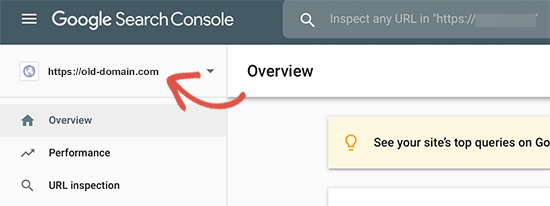
Bundan sonra, sol sütundan Ayarlar menüsüne tıklayın.
Şimdi, ‘Adres değişikliği’ aracına tıklayabilirsiniz.
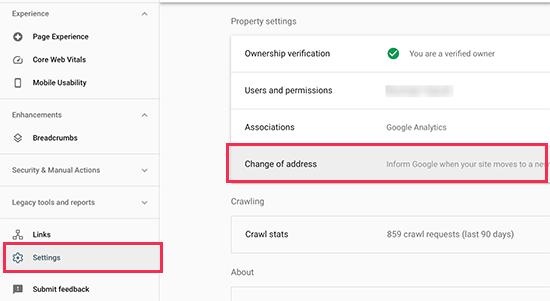
Şimdi, Google’ı Güncelle bölümünden yeni alan adınızı seçmeniz gerekiyor.
Ardından, ‘Doğrula ve Güncelle’ düğmesine tıklamalısınız.
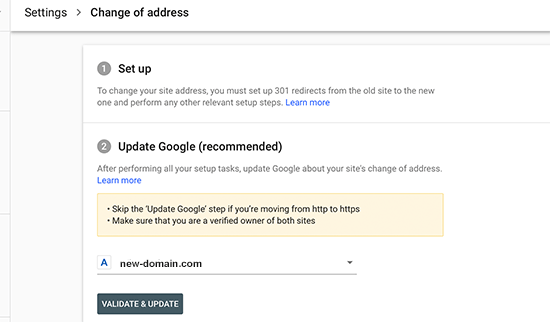
Hepsi bu kadar. Google şimdi eski alan adınızın yeni alan adına yönlendirildiğini doğrulayacak ve değişikliklerinizi kaydedecektir.
Bir sonraki ekranda, Google Search Console adres değişikliği talebinizi göndermeniz için size adım adım bir sihirbaz gösterecektir.
Kullanıcılarınızı Yeni Alan Adı Hakkında Bilgilendirme
301 yönlendirmeleri görevini yerine getirirken, geçiş hakkında kamuoyuna bir duyuru yapmak her zaman iyidir.
Bunu, yeni sitenizle ilgili bir blog yazısı yazarak ve bunu sosyal medya hesaplarınızda paylaşarak yapabilirsiniz.
E-posta bülteniniz veya anlık bildirim aboneleriniz varsa, onlara da bir duyuru göndermelisiniz.
Bu pek çok açıdan faydalı olabilir.
Her şeyden önce, kullanıcılarınızın yeni alan adını okuduktan sonra hatırlama olasılığı daha yüksektir.
İkinci olarak, kullanıcılarınızdan herhangi bir hata gördüklerinde size bildirmelerini isteyebilirsiniz. Sitenizi her tür tarayıcıda veya sistem ortamında tek başınıza test edemezsiniz, bu nedenle sitenize yeni bir çift gözün bakması her zaman yararlıdır.
Video Eğitimi
Bonus Kaynaklar
Aşağıdaki makaleler ve eğitimler, yeni bir alan adına geçtikten sonra SEO sıralamalarınızı takip etmenize ve yeniden kazanmanıza yardımcı olacaktır:
- Nihai WordPress SEO Geçişi Kontrol Listesi (Yeni Başlayanlar İçin)
- WordPress Blog Yazılarınızın Doğru Anahtar Kelimeler İçin Sıralanıp Sıralanmadığını Nasıl Kontrol Edebilirsiniz?
- WordPress Sitenize Gelen Web Sitesi Ziyaretçileri Nasıl Takip Edilir?
- Blog Yazılarınızı Bir Profesyonel Gibi SEO İçin Optimize Etmenin İpuçları (Kontrol Listesi)
Umarız bu eğitim WordPress sitenizi yeni bir alan adına taşımanıza yardımcı olmuştur. Ayrıca ücretsiz e-posta alan adı alma kılavuzumuzu görmek veya eksiksiz WordPress SEO kılavuzumuzdaki adımları takip etmek isteyebilirsiniz.
If you liked this article, then please subscribe to our YouTube Channel for WordPress video tutorials. You can also find us on Twitter and Facebook.





Maya
Should I keep all files on my old domain (the whole WordPress installation) or it is enough just to have .htaccess with 301 redirect?
James
Hi guys,
The 301 redirect doest redirect the pages, what can I do?
Logan Cale
I had a similar problem with the .htaccess redirect only redirecting the domain (front page), and not the sub-pages, but when I also added the line below in .htaccess file, all sub-pages were then redirected if they had the same exact name.
Redirect 301 / https://newdomain.com/Euan
Hi Logan. You, my friend, are a legend. Several hours of searching as I had the same problem – the front page was redirecting but nothing else. I added this line of code and it is now sorted. Thank you!
Kim Saxton
Hi,
This has been really useful thank you so much, but I am now a bit stuck.
I got up to step 2 and ran the deployment button on the installer php site. Then I went away for a week, I made some formatting changes to my newsite (just colour, logo not any changes with pages).
I now want to update my URLs on the installer update page. But I can no longer access it. It comes up with a 404 error page cannot be found. See
My old site is
Can you advise?
Thanks
Kim
Sorin Vizireanu
Excellent post, thank you.
Ashley
I have a question. We are a business and we just had an ecommerce shop built on our regular business website.
We know would like to take just the shop and put that on a separate domain.
How would that process work?
WPBeginner Support
Hi Ashley,
You will have to set up redirects in a way that only your shop URLs are redirected to the new domain name.
Admin
Peter Ishola
How do i download the package files? Do i have to download it from my wordress admin or from my cpanel because i cannot find any download link on my wordpress admin.
Thanks
Manpreet Singh Rehsi
Hi,
Thanks, for such a detailed article. This really helped to moving one of my blog to a new domain last month.
Right now my blog is undergoing a move in google webmaster. Now I want to implement SSL on my new domain.
Should I make a move to implement the HTTPS or wait for move to be completed in google webmasters.
Will SEO will take a negative impact if I implement https now.
Ahmed Rifshaan
Hello,
Regarding 301 Redirect you said, we should edit old .htaccess file…
What if we dont change host, only changing the domain name?
My site doesnt move, only the domain is changing..
In that case what should i do?
Jay Soriano
There is one part that could use a little bit of clarification, and I read through most of the comments and couldn’t find an answer. With regards to the 301 redirect, in the post you mention:
“In other words, whenever someone lands on one of your old posts or pages, then they will be automatically redirected to your new site.”
If they land on an old post (olddomain.com/post), will they be redirected to the post on the new domain (newdomain.com/post), or simply to the root domain (newdomain.com)?
WPBeginner Support
They will be redirected to the post.
Admin
Claudio
How long is it safe continue to keep the older domain and website, after you redirect to new one?
Jo
Hi, I don’t know if you can help me. I purchased a new domain name from my host. I followed the instructions in this article. When I logged into my FTP client I did so under my old domain name first of all (I think I thought I had to) and then on the ‘new session’ tab I logged in under my new domain name. Under my new domain appeared to be all the same files as my old domain.
The article said to make sure the root file was empty so I deleted all the files from the new domain name in the FTP client and uploaded the installer.php file and archive zip file.
When it comes to launching the installer.php file in my web browser it comes up with a 404 error and now I’m stuck. Do you have any advice?
Thanks!
Jo
UPDATE: I finally managed to get onto the Duplicator and have added a new MySQL database and run the tests. However, now when I try to log in to update the permalinks using my same username and password it says it doesn’t recognise my details. I tried ‘forgot password’ but it didn’t recognise my email.
It’s also saying there is HTTP 500 error on my new (and old) domain names.
Any advice would be great, please.
Thanks!
Amirhossein
Hi
I have a theme installed and active on my wp site right now:
1. It has a custom post type called “video_type”.
2. The URL pattern of all video_type post are like this: mysite.com/video_type/the-video-name-url. It means the /video_type/ is always there in all video post URLs.
3. There is another custom post type called “genre”. Which acts as “categories” but only for video_type posts.
4. The URL pattern for “genres” is like this: mysite.com/genre/the-genre-name-url. It means the /genre/ is always there in all genre URLs. And they contain video post lists.
5. All of my videos and genres are indexed in google and they mostly rank very well. Some of them rank 1-3.
Now I want to change the theme. The new theme does not recognize “video_type” and “genre”. And I don’t want theme to be recognized.
I have decided to change the “video_type” to “post” with “Post Type Switcher” plugin. But after changing type:
1.”genre” is no longer available for posts (Only categories are available).
2. And I cannot change the “genre” post type to “categories” with that Plugin.
3. mysite.com/genre/the-genre-name-url genres will be pages with no content.
4. The URL of the video posts changes. (there will be no “video_type” in the URL and I don’t want it to be BUT SEO?)
Here are my goals:
1. change “genre” to “categories”.
2. change the “genre” URLs.
3. change the “video_type” to “post”.
4. change “video_type” URLs.
5. I also want to Prune and Optimize my current categories. (Remove, Add and Edit some of theme).
So I want to know what is the best practice here for “Not having any negative SEO”? And how to achieve these goals anyway?
WPBeginner Support
You will have to set up redirects. You can use Regex to detect URL patterns and redirect them accordingly. Please see our guide on how to setup redirects in WordPress
Admin
Michel Fortin
If I have two different websites and we want to transfer one of them to the other one. The thing is that we want to close the first website now but transfer the content later, what would be the best practice on the redirect side?
Michael Barth
Thanks for that article, but my problem is a bit more complex. I have a 301 redirect for a domain name I use to a hoster for templates websites. I now have a new hoster and a WordPress site there. I will change my 301 to now redirect to my new wordpress site. I have no access to the htaccess file on the “old” hoster, and need to cancel the contract anyway.
Any idea how to best do that .
Thank you.
Sujeet Thakur
Thanks a lot from bottom of my heart. My all problem are solved to read your blog. thanks again ..!
saeed
I am looking to safely migrate wordpress website to new html website without losing the google ranking. please contact
Sant
Hi SAEED,
Did you move your domain WordPress to HTML?
I am planning my website to move from WordPress to HTML, I want to know is this effects any SEO?
Please suggest on this?
Thanks in advance!
Alessandro Bertelli
Hi.
I am moving a site from a dummy/test subdomain to the definitive domain (something like moving from temporary.example.com to example.com.)
While i kept the site mostly offline during developement i forgot for a brief period the site open.
This was enough for googlebot to snuck in and i find many pages indexed already, with the addresses starting with temporary.example.com/whatever instead of example.com/whatever.
Now i am going to put online the site on the real address and i fear that the fact that the same pages are indexed twice will damage SEO.
I have no previous traffic or seo score to save from the test subdomain, can i just delete the old site?
WPBeginner Support
Hi Alessandro,
Once your site is live, you can set up a 301 redirect from temporary url to your current URL. Take a look at our guide on how to set up redirects in WordPress.
Admin
Alessandro Bertelli
Hi, thanks for the answer.
As i said the site i want to move has no SEO to save… i am only worried of google thinking less of it because of the (temp and no more existing) duplicate pages.
The redirect would be just for the search bots.
Is a 301 redirect a better solution instead of just removing the site?
WPBeginner Support
Even if you remove the site, you would still need to tell search engines where it has gone. This way search engines won’t penalize the new and live site for duplicate content. 301 is the HTTP code which tells search engines that the content they are trying to access has moved to this new location.
Jeffrey Collins
I simply made my site secure, changing the url. I have used a 301 redirect from the root, will that redirect all pages? This is a wordpress site.
Ataul Ghani
i just move the old domain to new domain. The process was something like that, just install wp to new domain and import all files and database on it. Then old domain made an permanent redirection to new domain. I shared sitemap to web master and other search engine also. Also old domain web master admin i said to change domain name by using domain name changer tools in web master. But still not remove any files from old domain directory, so is that will be problem for me??? lease let me know.
Thank You!
Rabin Mahmud
Hello,
I have a old site but I want to redirect that to new domain without losting my any permanent SEO juice. But I need to know that should I redirect all the urls of old domain to new site similar urls or I just need to redirect the domain Name.
It’s very important for me to know.
Thanks
Ravi
I have properly 301 redirected my site to new domain. Do i need to add sitemap of new domain after redirection and address change at webmaster tools? Also my site traffic has significantly gone down. Around 70% drop within 10 days. Is this normal? And how much time will it take to go up.
Please answer and help.
Sandy Gogoriya
I want ask you one question. I have two website. One is old and one is new. so i want transfer my old website 5 post to my new website. Like on my old website have 5 smartphones post and i want publish these post on my new domain with old website content that already publish so what i do now.
Ernest
Hi, thank you for the great explanation! I am wondering, Does putting the code in the htacces file mean That i don’t need to redirect all individual links? I was looking at the plug-in 301 simple redirects, but there I need to fill in every single link.
My old site is live for a while so I would like to keep the page values for Google.
BR!
Josh
What should be done with the content on the original site after the duplicate content, all 301 redirects. and change of address in the search console are complete? Is it best to remove the original content? Any chance it will get penalized as duplicate content?
WPBeginner Support
You don’t need to have the content live to set up a redirect from one WordPress install to another. But if you do, then that’s alright too, because your users and search engines won’t stay on the old content and they will be redirected. If your content was hosted on a platform like WordPress.com or Blogger, then we would recommend you to keep your content in private mode for at least six months.
Admin
David Budimir
Hi there,
We’re migrating our blog from a blog.domain.com to domin.com/blog. Out site is currently live on our main domain, will migrate the blog to the same database mean we need to access it differently?
In other words, will it affect our process for creating blog content in the wordpress dashboard?
Thanks!
WPBeginner Support
No, it wouldn’t affect blog creation. However, you may need to update URLs in database to make sure that they are pointing to the new location.
Admin
sudhir
Thanks WPBEGINNER team for writing such an awesome and helpful article. I have followed all steps carefully and migrated my old domain to new domain, everything is working fine except one, that is; my old home url is not redirecting to new one while all internal pages are redirectd to new pages.
Michall Helmbæk
THX for the best article in a long time that really works!
suhan ahmed
I want to move my https enabled site to a new https enabled domain for rebranding purpose. For example,
From https olddomain.com
To https newdomain.com
To put 301 code to the .htaccess file of old domain. I need to keep the installation of old domain untouched.
The problem is here I will need two SSLs, IPs (in some cases, servers) which is a bit costly for me.
What can be the best solution here?
Or
Can I follow the below mention method!!!
If I switch back to my https olddomain TO http olddomain
and then from olddomain TO newdomain.
Will I lose ranking or be penalized by Google here?
roshan christy
Hi.,
This is article exactly something I was looking today but a bit confused now. My blog was hacked and was injected with a conditional redirect malware. Since my hosting provider allows two managed WordPress installs, I migrated the ‘uploads’ folder and database to the other one. Now I wish to change the domain name too as the current one have many external spam websites indexed by Google as subdomains. I want to keep the old domain name but delete the old site with malwares. But this article is suggesting to keep the old website with the .htaccess edit. Can I use the old domain along with new one by deleting the old website?
Leonardo
Nice, thanks. It was very helpfull!
New
Hello
If I just move my content wordpress to newsite as the same domain I am using, Is it neccessary to do 301 redirect?
Rocky
In new Google Webmaster Tools there is not any option of changes of address option. please tell me now how can i notify google.
Joey Espinoza
Great tutorial, thank you
Aron Jay
Does this work to specific posts or it will automatically redirect everything to the new domain.
I’m planning to move some of my posts to another domain, not entirely the whole blog. Thanks!
Michael J.
Hi WPBeginner – Your step-by-step guide is great…but, I just have a quick question to confirm before moving forward with changing my wordpress domain…
Unfortunately, the Duplicator Plugin is not working for me….so, can I manually copy & paste a backup of the my ‘old’ site into a new directory for the ‘new domain?…and follow the rest of the steps above.
Also, I am using the same hosting for my old & new domain — So, do I create a new directory folder for the ‘new’ domain — and keep the ‘old’ domain folder on my hosting?…basically, my hosting would have (2) site folders?…the old & new.
I’ve read various places say I only need to point to the new domain on wordpress…however, im extremely concerned with losing my SEO rankings from my old domain, so i’ve been kindda hesitant with the process..
Any reply would be greatly appreciated…Thanks!
WPBeginner Support
You should create a new directory on your hosting server. Download all your WordPress files and then upload them to the new directory. You will also need to export your old database. Create a new database in your hosting cPanel. Open phpmyAdmin and then import your old database. Rest of the steps would be the same.
Admin
Michael J.
Thanks for the reply!…I will make sure to follow your detailed instructions.
Bunty Pundir
Hey,
I created the package with Duplicator plugin and also, uploaded installer and archive package to new domain but unable to launch installer.php using example.com/installer.php and the browser showing server not found!
Help please:-(
Mihira
Success!
I was afraid to take up transfer of my domain from .in to .com since 6 months or more. This guide is so easy to follow, I was up and running in the new domain within an hour. Thank you wpbeginner for this helpful post.
One question though… My old domain didnt have such a great SEO characteristics to pass on. I no more want to use that old domain. Can I set a 301 direct in .htaccess of old site and leave it WITHOUT RENEWING THE DOMAIN WHEN IT EXPIRES OVER THE PERIOD?
Please let me know!
WPBeginner Support
Yes, you can do that. However, it is recommended that you keep the domain up with redirects for at least 90 days. You should also submit a change of address request to Google from Google webmaster tools.
Admin
Edward
Another question: if I delete all the old images in the old site folder, google webmaster will tell me there`s 100,000 dead paths and I will have to delete them one by one. Should I just leave the image folder untouched? I don`t want to see all those missing file notifications in my webmasters account.
Edward
I will be keeping the same .com domain but the images in the old pages will have a different name. ( e.g. from 0429_lg.jpg to ocean_home.lg.jpg so I am changing the name of 10 images ( now will have twice that number ) on each listing with different name. Does that affect SEO? I guess having the new seo friendly name in images might even be better.
Shreya
Hi there !
Recently I tried migrating my wp website to new domain ( shared server) but the Duplicator plugin didnt work . Then I opted for manual migration, everything is working well but I can’t aceess my wp-login.php page for my new website in new domain.
Can you please help me on this matter ? I shall provide more details of both my websites too .
Thanks .
Zane
Thank you! Followed instructions and worked perfectly.
Duane Reeve
I’m busy migrating a clients domain and a relatively old post on MOZ.com states one should redirect each URL independently. While MOZ is an industry leader in SEO, I’m questioning this since their post is from 2009. Is this overkill or the best way to proceed?
WPBeginner Support
If you have a static site with less than 10 pages, then this makes sense. But if you are moving a site with hundereds of posts, then it will be quite difficult to setup each redirect manually.
Admin
Duane Reeve
Thank You – Clients WordPress site had 36 pages/posts, which I redirecting manually using the Redirect Plugin. I then updated the sitemap and re-submitted this to both Google & Bing.
I didn’t redirect image or tag URLs.
After 48-hours, of doing the page/post redirects, I submitted the URL Address Change to both Google and Bing Webmaster Tools. I decided to give both Search Engine time to detect the Page/Post Redirects and will do a Domain Redirect (using .htaccess file) at the end of the week.
Based on my Google Analytics & Google Webmaster Tools for the new Domain I’m pretty happy with the results so far.
Dario Fumagalli
What Moz says is 100% safe, whereas what WPBeginner says has one big issue: the old website sitemap.
Adding a sitewide 301, **also** redirects calls to the old sitemaps, whereas Google needs it to stay in there to prove both the old sitemap and the new one are same or similar.
Therefore, if you do it the Moz way you are ultra-safe, if you do it the WPBeginner way you need to add exceptions to exclude all the old sitemap index (if any) and sitemap(s) until Google understand both refer to the same ownership.
Mark D
Hi, I don’t have an FTP provider. When I loaded one, it lit up my anti-virus software. I am trying to create a website for a friend based on my site. Is there an easy, non-FTP solution, to clone to my friend’s domain. Once that’s there, I can then update with her content.
Thanks,
Lynn Dye
Is it a good idea to delete my old site (except for the .htaccess file), on my old host so I don’t have 2 exact sites on two hosts?
Nelson
Can your created a tutorial moving a wordpress site to a new doman wihout a plugin, like for example moving subcategory to the main site or subdoman to the mina site wihtout a plugin.
Satish
Hi, very useful article but i have a doubt . What if i download my backup manually by making zip, also download the database from Mysql from cpanel.
And then manually upload to the new host filemanager. Do i need to change the URL in database from old-domain.com to new-domain.com before uploading the database to mysql?
Hope you understand, what i’m saying!
Daniel Ruyter
Question on the redirects – I’m currently running two sites (two TLD’s, two hosts) and would like to consolidate into a single site, retiring the “old” site host. Can I redirect the “old” TLD to the new at the DNS and then add rewrite rules to my “new” site’s .htaccess for the migrated posts?
Thank you!
-Daniel
Lynn Dye
This has worked well – question on the redirect. I changed my domain AND hosting. So I’d like to close out my old hosting account.
How long should I have the redirect for my old domain? I’m planning on keeping the old domain for some time.
Would a forward on the old domain accomplish the same thing as the 301 redirect?
Daniel Ruyter
I’d keep the old domain name redirected as long as you’re able.
Lynn Dye
If I used BackupBuddy to move my site to a new domain and then followed the directions to do the 301 redirect, shouldn’t I get the same result
What about typing in the old and new url that Duplicator has you do – how is that step done with BackupBuddy?
Thanks for an interesting post.
WPBeginner Support
Yes, you can use BackupBuddy too.
Admin
Katie Steckly
So if I transfer my site with these exact instructions, with Google analytics automatically keep working? Or do I need to re-install the tracking code on my new site, and take it off the old one?
Travis Pflanz
Google Analytics will still work as long as you use the same UA code as before. That said, it may be worthwhile to setup a new view in your Google Analytics dashboard after you make the change